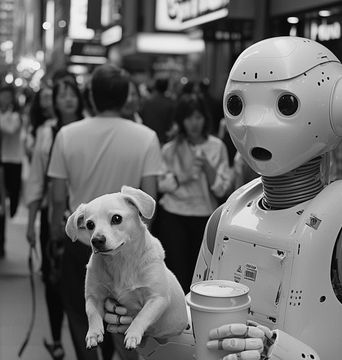MUSK REVEALS ARMY OF TESLA 'OPTIMUS' BOTS SERVING DRINKS, WALKING DOGS, AND PROMISES 'NO POVERTY' FUTURE!

In a relatively tight-lipped Cybercab event, Tesla set the future in motion with the revelation of its humanoid Optimus robots. As predictions about artificial intelligence taking over manual chores take a solid form, millions globally are ruminating on what this technological advent entails for the future.
In a video showcasing the prowess of these autonomous beings, the robots are witness performing mundane household tasks like collecting packages or watering plants with stunning efficiency. Yet, this is just the tip of the iceberg, maintains billionaire tech tycoon, Elon Musk, the mastermind behind this groundbreaking innovation. Musk asserts that these cybernetic organisms can virtually “do anything” – a broad spectrum that encompasses babysitting, lawn mowing and even walking dogs.
In terms of affordability, Musk has ballparked the estimated cost of each robot to be between $20,000 and $30,000. An investment that he boldly suspects could result in the "biggest product ever of any kind." At the event, some of the robots even began interacting with guests, albeit their duties presently remain restrained.
While Optimus robots have only just been unveiled to the world, the timeline Musk has laid out is aggressive. By the year's end, these robots are projected to start executing "useful tasks," with potential sales to the public beginning as early as next year.
The novelty factor is high here, but skepticism lingers alongside. The initial reveal of the Tesla bot project in 2021 was met with chuckles and disbelief as it involved a man in a robot suit. But laughing it off may not be an option this time.
A visionary who never shies from making bold claims and exceeds expectations, Musk envisions the Optimus playing a pivotal role in triggering a "fundamental transformation for civilization." More specifically, he envisions a future in which there exists no poverty - a seemingly utopian ideal underpinned by the calculated application of artificial intelligence and robotics.
The impact of these robots can indeed be profound and far-reaching. If Musk can deliver as promised, these cybernetic workers could significantly reduce the need for human labor in several industries, potentially creating economic ripples worldwide, ranging from increased productivity to job displacement. These could, in turn, give rise to socioeconomic and ethical questions about machines replacing people in the job market.
On a more positive note, mass adoption of these robots could lead to new opportunities. They could revolutionize the health and care sectors, assist in dangerous jobs, or simply increase free time for individuals, fostering a culture of creativity and innovation.
Furthermore, the robotic era could decrease income inequality by augmenting human productivity - an important stepping stone toward Musk's vision of eradicating poverty.
In conclusion, the unveiling of Tesla's Optimus robot has spurred a whirlpool of contemplation about the future. It's pertinent that we watch such developments closely, for they have the power to redefine civilization as we know it. The question remains, is the world ready for this cybernetic revolution?